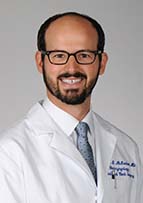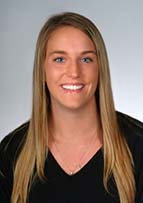The Medical University of South Carolina will be the first clinical trial site in the country to test a new kind of cochlear implant for adults with hearing loss. Unlike traditional implants, the Acclaim, made by Envoy Medical, isn't visible to others and doesn't require daily charging.
"There's an incredible amount of excitement about this device," said Teddy McRackan, M.D., medical director of the MUSC Health Cochlear Implant Program. He's leading MUSC's part of the trial. It's one of seven sites in the trial and the only one on the East Coast. The sites combined will work with a total of around 56 patients.

"The nice thing about it is that it uses the body's natural hearing bone movements to detect sound rather than an external microphone. So it's really a major advancement," McRackan said.
Audiologist Elizabeth Camposeo, assistant director of the MUSC Health Cochlear Implant Program, explained how the new implant works – starting with the cochlea. "The cochlea is kind of like the last stop in your ear where sound actually becomes a signal for your brain," she said.
That makes it an ideal place for an implant to try to improve hearing.
"Traditional cochlear implants have something on the outside of the ear that collects sound through a microphone and then digitizes it. We call those processors. It looks like a big hearing aid with a round disc that sticks to the head and pushes the signal through the skin to then implant below."
The Acclaim implant takes a different approach. "It has a pickup mechanism that turns your eardrum and ear bones into the microphone," Camposeo said. This eliminates the need to wear any external parts.
McRackan said the fact that it's completely under the skin is important to patients. "It's a major selling point. There's a substantial number of patients who just aren't interested in pursuing cochlear implantation because of the stigma, especially with having something on the side of their head."

He said the implant's staying power is key as well. "Patients have 24-hour hearing with it, so they can hear when they're falling asleep, when they're awake, anytime. With the other cochlear implants, you have to take it off at night to charge it. It can't get wet unless you have a certain kind of accessory. When you're exercising or playing sports, you may have to take it off for safety. But with this device, you don't even know it's there."
McRackan said the battery, which goes in the chest and connects to the implant through a thin cord, needs to be charged every four or five days.
Camposeo said its simplicity stands out to her. "Because there's no equipment to manage, it should be a lot easier for patients to be able to access this technology and do it successfully. The only thing they really have to do is charge it."
The trial will focus on testing whether the Acclaim implants are able to help people with severe to profound sensorineural hearing loss. A sensorineural condition is caused by damage to the auditory nerve or cochlea (inner ear). The trial will also monitor participants for any medical problems.
An early feasibility study tested these implants on three adults. It worked for all three, but the researchers did note that the surgery was more complex than for traditional cochlear implants.
McRackan said MUSC Health has one of the bigger cochlear implant programs in the country and is well-equipped to implant and monitor the devices. "We're seeing more and more implants done every year. We do over 200 cochlear implants at our center each year. And the outcomes are just getting better and better."






